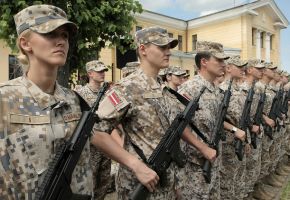Analytics, Education and Science, Latvia, Legislation, Russia, Security
International Internet Magazine. Baltic States news & analytics
Saturday, 20.04.2024, 05:36
Latvia needs to have two brigades, decentralized units to withstand possible war with Russia
 Print version
Print version |
|---|
Conducted by the Latvian Institute of International Affairs, the study looks into the main methods and means of warfare that Russia could employ against the Baltic countries, in various proportions and succession.
Russia could hire public and non-governmental organizations – for the purpose of altering public opinion, says the study. One of the main methods to curb the effectiveness of hostile political and non-governmental organizations is the government's ability to dominate the local information space. For this, strategic communication has to be adapted to the ambitions of the country's defense system, in addition, the role of society in national defense has to be better explained.
Russia could also use extensively special operations forces and irregular military or paramilitary units. Identification of such units could be done through an all-embracing information network involving territorial units and other governmental organizations, for instance, the Municipal Police. Involvement of local residents is highly important to guarantee the efficiency of such a network.
Latvia and the other two Baltic countries, parallel to the discussions about permanent deployment of NATO military infrastructure in the Baltics, should also be engaged in a dialog on permanent presence of U.S. or British troops in the Baltic countries. Researchers also believe that the Baltic countries should strive to deepen their military cooperation with Finland and Sweden.
The experts indicate that Latvia's laws and regulations should be altered, as the law currently does not ensure adequate use of national resources for averting threats.
The researchers also believe that the process of military decisions has to be improved by maximum decentralization of command control structure, development of alternative command control systems, and delegating responsibility to smaller units. Such decentralization would limit the effectiveness of Russian technical intelligence and electronic warfare.
According to the study's conclusions, the National Armed Forces should consider increasing the Land Force to at least two cohesive professional brigades, which would be able to advance and join battle in 12-24 hours after receiving orders, and operate until NATO reinforcements arrive. The main task of these Land Force units would be to prevent an adversary from capturing cities and towns, transport infrastructure objects, and establishing supply corridors. The size of a brigade may vary, but usually one brigade is 2,000 to 3,000 strong.
The study emphasizes that mechanical increase in the Armed Forces personnel will not achieve the necessary effect. What is needed is cohesive combat-ready units, able to operate independently of each other, and a brigade of mobile riflemen is the smallest tactical unit up to the task.
While the Armed Forces do not have sufficient aeromobility and do not have a sufficient number of combat vehicles, decentralization of units is important, thus reducing time necessary for the deployment of a unit. The study indicates that Estonia and Lithuania are also planning to have two motorized infantry brigades each.
In case Russia holds military exercises near Latvia, involving more than 3,000 troops, the Armed Forces of Latvia should react by announcing a higher readiness regime. The public must be informed about the reasons for this. The Armed Forces should remain on high alert until it is known that Russian troops have returned to their bases after the exercise.
The study says that decentralization of units and emphasis on small units should be added to the military doctrine of the Armed Forces, as such units would be able to operate simultaneously in the entire territory of the country should Latvia be occupied. Development of a decentralized system of supplies and ammunition stocks is very important in order to ensure functionality of autonomous units for a long time.
In addition, the Armed Forces must consider creation of rapid reaction units in the form of reinforced companies, deployed in Northern Vidzeme and Eastern Latgale within 40 to 60 kilometers from the border.
Work should continue on improving the Armed Forces' combat readiness in the winter and the ability to counter landing operations, as well as to create areas for allied forces' landing.
The experts believe that, theoretically, the said recommendations can be implemented within a comparatively short period of time. However, it needs to be understood that such a system will be viable only if public awareness becomes adequate and society becomes involved in national defense.
Educating students would be one of the most effective ways to educate society, indicates the research.
In conclusion, the study urges for more active use of all opportunities offered by military cooperation among the Baltic countries.








 «The Baltic Course» Is Sold and Stays in Business!
«The Baltic Course» Is Sold and Stays in Business!

